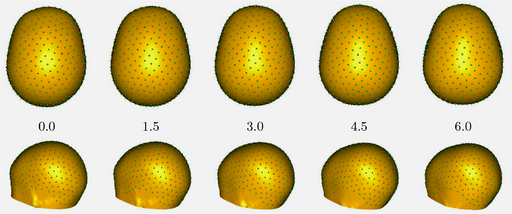Difference between revisions of "Projects:ShapeRegression"
From NAMIC Wiki
| (2 intermediate revisions by 2 users not shown) | |||
| Line 11: | Line 11: | ||
= Description = | = Description = | ||
| − | + | Shape regression promises to be an important tool to study the relationship between anatomy and underlying clinical or biological parameters, such as age. In this paper we propose a new method to building shape models that incorporates regression analysis in the process of optimizing correspondences on a set of open surfaces. The statistical significance of the dependence is evaluated using permutation tests designed to estimate the likelihood of achieving the observed statistics under numerous rearrangements of the shape parameters with respect to the explanatory variable. We demonstrate the method on synthetic | |
| + | data and provide a new results on clinical MRI data related to early development of the human head. | ||
= Key Investigators = | = Key Investigators = | ||
| Line 19: | Line 20: | ||
= Publications = | = Publications = | ||
| − | + | * M Datar, J Cates, P T Fletcher, S Gouttard, G Gerig, R Whitaker, [http://www.cs.utah.edu/~manasi/pubs/ShapeWorksMICCAI2009.pdf|Particle Based Shape Regression of Open Surfaces with Applications to Developmental Neuroimaging], MICCAI 2009 | |
| − | |||
| − | * M Datar, J Cates, P T Fletcher, S Gouttard, G Gerig, R Whitaker, Particle Based Shape Regression of Open Surfaces with Applications to Developmental Neuroimaging, MICCAI 2009 | ||
[[Category:Shape Analysis]] [[Category:Statistics]] | [[Category:Shape Analysis]] [[Category:Statistics]] | ||
Latest revision as of 20:34, 16 November 2012
Home < Projects:ShapeRegressionBack to Utah Algorithms
Particle Based Shape Regression
Description
Shape regression promises to be an important tool to study the relationship between anatomy and underlying clinical or biological parameters, such as age. In this paper we propose a new method to building shape models that incorporates regression analysis in the process of optimizing correspondences on a set of open surfaces. The statistical significance of the dependence is evaluated using permutation tests designed to estimate the likelihood of achieving the observed statistics under numerous rearrangements of the shape parameters with respect to the explanatory variable. We demonstrate the method on synthetic data and provide a new results on clinical MRI data related to early development of the human head.
Key Investigators
- Utah: Manasi Datar, Joshua Cates, P. Thomas Fletcher, Sylvain Gouttard, Guido Gerig, Ross Whitaker
Publications
- M Datar, J Cates, P T Fletcher, S Gouttard, G Gerig, R Whitaker, Based Shape Regression of Open Surfaces with Applications to Developmental Neuroimaging, MICCAI 2009
